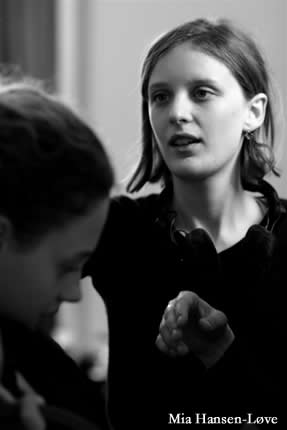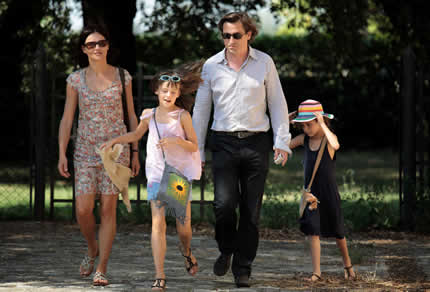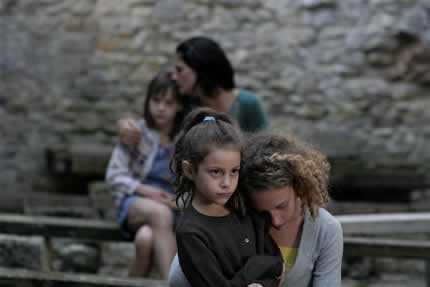The Father of my Children is the story of Paris-based film producer Grégoire Canvel (Louis-Do de Lencquesaing) that has it all — a wife and three daughters he adores and a stimulating job that he’s devoted to. On the surface he seems invincible, maintaining humor and charm as he tirelessly juggles the never-ending demands of his production company with his domestic responsibilities. But when Grégoire’s reserves — both financial and emotional — reach a dramatic breaking point, his wife Sylvia (Chiara Caselli) and children are forced to cope with the profound repercussions.
Cinema came into Mia Hansen-Løve’s life when she was eighteen, as Olivier Assayas made her start as an actress in Fin août, début septembre (1998). Two years later he gave her the part of Aline in his Les destinées sentimentales (2000). Their artistic collaboration was coupled by a union in real life, Mia and Olivier becoming life companions. In 2001, Mia Hansen-Løve began studying at the municipal Conservatory of Dramatic Arts in Paris’ 10th district but she dropped our after two years to contribute instead to the famous film magazine “Les Cahiers du Cinéma”, where Olivier Assayas also wrote. In 2001, she tried her hand at directing and as of the first day of shooting discovered that this WAS what she wanted to do. The result was Après mûre réflexion (2004). Since then, although aged only twenty-eight, she has already made two more films, _Tout est pardonné (2007)_ and Le père de mes enfants (The Father of My Children) (2009), both acclaimed by the critics, both showing consistent thematic and stylistic unity.
twenty-eight, she has already made two more films, _Tout est pardonné (2007)_ and Le père de mes enfants (The Father of My Children) (2009), both acclaimed by the critics, both showing consistent thematic and stylistic unity.
Bijan Tehrani: What initially inspired you to make The Father of My Children?
Mia Hansen-Løve: The primary motivation was to show both the personality of the main character, the producer (based on the life of Humbert Balsam), and also his story which of course involved his suicide, as well as the last few days of his production company. This real story was something that I was very taken by and I was motivated to be able to transpose it into fiction and create a fictional person who would represent him. I’m sure there are probably a lot of other subconscious subtext that are related to my own background or my own family history but I was very much taken, particularly when I was writing the screenplay for The Wives and The Daughter, I really wanted to show this family story from something that took place in my own family and transpose it from fiction and place it into a contemporary setting.
BT: After many years we have you as another French filmmaker emerging from a wave similar to French New Wave Cinema. A free critics say that you do not use a certain filmmaking style in your films, would you agree with this?
MH: This question of style does come up very often and I have to say it’s probably one of the more thankless aspects of my job to consider it, but it is certainly not something that is without style. What I have tried to do is try and seek a style that is really invisible, it is a style that is very neutral and that tries to present things as they are. When thinking about doing it this way, I think a lot about filmmaker like Eric Rohmer, who want to paint a true picture of the world and give the spectator or the viewer a real experience of what the real world is like. I know that I myself as a viewer, that is what I enjoy to see, so what I have tried to do here is not make the style ostentatious and give you the feeling of truth and to portray things as they are.
BT: How much did your own personal background, coming from a Danish/German family, and the fact that both of your parents were philosophy professors has influenced your career as a filmmaker? MH: Well it is actually kind of hard to say, but the fact that both of my parents were philosophy professors helped me in the sense that my parts are not a part of the world of cinema. When I came into the world of cinema I was on my own and in many way I am very self taught when it come to filmmaking, I did not got to cinema school or have any professional training in cinema. The other thing that was important about my parents was really their relationship and what your life is like and your own search for wisdom and spirituality. I was raised in an environment where we were taught that life is really about finding truth and wisdom. I think that what I try to do in my films is to present this idea in the film and search for what is true and what is real in life. My father was of Danish back ground and where he is from they have people from all over the world. In my mind I created this fantasy of seeing all of these different places and this is one of the reasons why I always use foreign actors in my films.
MH: Well it is actually kind of hard to say, but the fact that both of my parents were philosophy professors helped me in the sense that my parts are not a part of the world of cinema. When I came into the world of cinema I was on my own and in many way I am very self taught when it come to filmmaking, I did not got to cinema school or have any professional training in cinema. The other thing that was important about my parents was really their relationship and what your life is like and your own search for wisdom and spirituality. I was raised in an environment where we were taught that life is really about finding truth and wisdom. I think that what I try to do in my films is to present this idea in the film and search for what is true and what is real in life. My father was of Danish back ground and where he is from they have people from all over the world. In my mind I created this fantasy of seeing all of these different places and this is one of the reasons why I always use foreign actors in my films.
BT: What is very interesting about The Father of My Children is that after the suicide of the main character many people expect the film to end, but the film continues on and the character is better explained after his death, can you explain why you decided to present the film in this way?
MH: I think that this idea of having the film divided in two was form that we had in place from the very beginning. I really wanted to have this whole idea of the rediscovery of the character after his death from the very beginning. What I really wanted to explore in the second part of the film is the new relationship that the character have with this person who is now someone who is gone; how do  they deal with him and his memory. In some ways this is directly related to my own experience with Humbert Balsam, I knew him for one year and then for two years after his suicide. So there were three years of my life that he was apart of it but for only one of those years was he alive. After his death I really thought a lot about him so that Idea of duality and cutting the film in two was there from the start.
they deal with him and his memory. In some ways this is directly related to my own experience with Humbert Balsam, I knew him for one year and then for two years after his suicide. So there were three years of my life that he was apart of it but for only one of those years was he alive. After his death I really thought a lot about him so that Idea of duality and cutting the film in two was there from the start.
BT: How did your experience as an actress help you go about casting The Father of My Children?
MH: Actually, I don’t think that it was really my experience as an actress because I was only in two films and I was very young, but it was a very divisive experience in my life because it showed that what I really wanted to be was a director. Whether or not my experiences as an actress directly informs my decisions in terms of casting, I think that it really gave me a sense of comfort and ease with the actors. This is also true in my choice of children because I was relatively young when I began my career as an actress.
BT: Your films give us the hope that we may be able to see a new wave of French cinema, do you think that this will happen?
MH: I’m very touched that you said that but I don’t think that I should be seen as something new or fresh in French cinema because I feel that the situation in French cinema right now is a very good one. We still have people from the original new wave generation, and we have people in this generation who are making great films.

